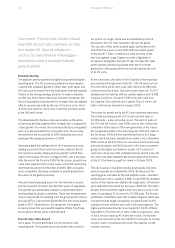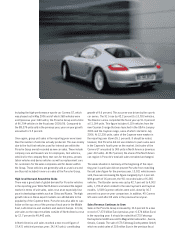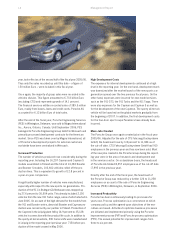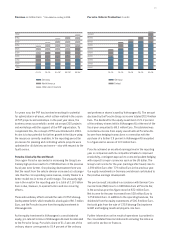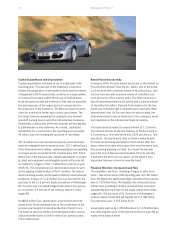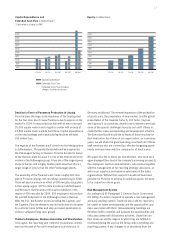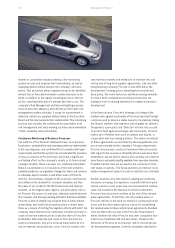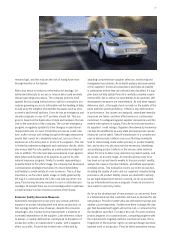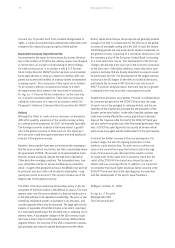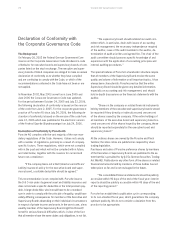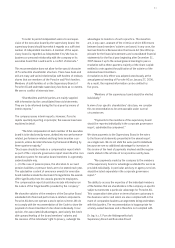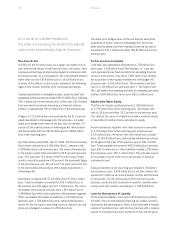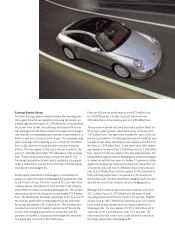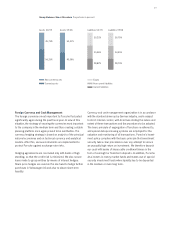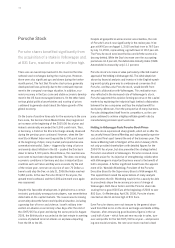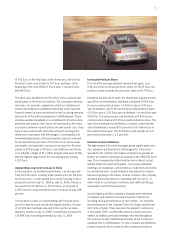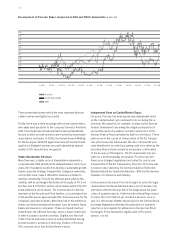Porsche 2005 Annual Report Download - page 24
Download and view the complete annual report
Please find page 24 of the 2005 Porsche annual report below. You can navigate through the pages in the report by either clicking on the pages listed below, or by using the keyword search tool below to find specific information within the annual report.22
Declaration of Conformity with
the Corporate Governance Code
The Background
On February 26, 2002 the Federal German Government Com-
mission on the Corporate Governance Code introduced a code
of behavior for executive boards and supervisory boards of com-
panies listed on the stock exchange. The executive and super-
visory boards of listed companies are obliged to make an annual
declaration of conformity as to whether they have complied
and are continuing to comply with the Code, or which of the
recommendations contained in the Code have not been or are
not applied.
In November 2002, May 2003 as well as in June 2005 and
June 2006 the Corporate Governance Code was updated.
For the period between October 24, 2005 and July 23, 2006,
the following declaration of conformity is based on the version
of the code from June 2, 2005. For the corporate governance
practice of Porsche AG since July 24, 2006, the following de-
claration of conformity is based on the version of the code from
June 12, 2006 which was published in the electronic version
of the Federal Gazette (Bundesanzeiger) on July 24, 2006.
Declaration of Conformity by Porsche AG
Porsche AG complies with the vast majority of the non-man-
datory regulations of the Code. However, it does not comply
with a number of regulations, primarily as a result of company-
specific factors. These regulations, which were not complied
with in the past and which will not be complied with in future,
are listed below, together with the reasons for current and
future non-compliance:
“If the company takes out a D&O (directors and officers’
liability insurance) policy for the executive board and super-
visory board, a suitable deductible should be agreed.”
This recommendation is not complied with. Porsche insures
the D & O risk under its general asset and liability insurance and
does not include a specific deductible in the total premium pay-
able. A large deductible, which would have to be a standard
sum in order to comply with the principle of equality, would have
widely differing consequences for members of the Executive and
Supervisory Boards depending on their individual circumstances
in respect of private income and assets. In the worst case, a less
wealthy member of the Supervisory Board might find himself/
herself in serious financial difficulties which, in view of the fact
that all members have the same duties and obligations, is not fair.
“The supervisory board should establish an audit com-
mittee which, in particular, deals with issues of accounting
and risk management, the necessary independence required
of the auditor, issue of the audit mandate to the auditor, de-
termination of audit priorities and agreed fee. The chair of the
audit committee should possess specific knowledge of and
experience with the application of accounting principles and
internal auditing procedures.”
The special features of Porsche’s shareholder structure require
that all members of the Supervisory Board receive the same
quality and volume of information on all important topics. It has
always been characteristic Porsche practice that the entire
Supervisory Board should be given very detailed information,
especially on accounting and risk management, and should
hold in-depth discussions on the financial statements with the
auditor.
“Shares in the company or related financial instruments
held by members of the executive and supervisory boards should
be reported if they directly or indirectly exceed one percent
of the shares issued by the company. If the entire holdings of
all members of the executive board and supervisory board ex-
ceed one percent of the shares issued by the company, these
should be reported separately for the executive board and
supervisory board.”
All the ordinary shares are owned by the Porsche and Piëch
families; the share ratios are published as required by share
trading legislation.
Purchases and sales of Porsche preference shares by members
of the Executive or Supervisory Boards are published to the ex-
tent that this is provided for by § 15a German Securities Trading
Act (WpHG). Publication in any other form of the shares or related
financial instruments held by members of these bodies has not
taken place so far and is not envisaged in the future.
“The consolidated financial statements should be publicly
accessible within 90 days of the end of the fiscal year; interim
reports should be publicly accessible within 45 days of the end
of the reporting period.”
Porsche has established a publication cycle corresponding
to its non-standard fiscal year, which guarantees the company
optimum publicity. We do not consider a deviation from this
practice to be appropriate.
Corporate Governance Code


